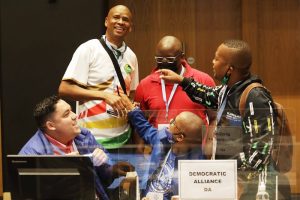
Staff Writer
With results of the 1 November 2021 local poll slowly emerging, coalitions will play an important part in the country’s politics over the next few years.
Around 45 hung municipalities have thus far arisen out of the 270 municipalities in total, with the vote tally standing at 80%.
Both the ruling ANC and the opposition have emerged battered, and will likely have to enter coalitions to continue running previously governed municipalities. Further, only 3 of the 8 metros will likely be out rightly governed, with coalitions required for the others.
All parties have since announced their willingness to work toward coalitions, with differing demands, however, operationalising and institutionalising these will prove very difficult, especially if the recent past is considered.
Speaking to Radio Islam International, Angelo Fick, Director of Research at ASRI noted the reasons for previous coalitions, arguing that these were not interest based and more based on malice, leading to their instability. He said, “I think in the past we’ve had coalitions of spite, where they were basically getting together to keep somebody else out of power; this time round, I’m hoping the politicians spend much more time negotiating what it is they want with one another. That means figuring out what they can compromise on, and what they will have in common by way of common priorities for the municipality.” Fick was opposed to the idea of non-negotiability, arguing that smaller parties would do better in weighing up how coalitions could assist service delivery, but that South African politics isn’t currently on this trajectory. This, Mr Fick, alluded, is an issue that even impacts the opposition Democratic Alliance, which has ruled out a coalition with the EFF – something which may lead to it losing power in the medium term according to Fick. It may also lead to further transparency issues in relation to finances if the ANC and EFF form a coalition.
Concerning the EFF, Fick portended that a key reason informing its weaker than expected performance was the segment appealed to by the party, the youth. Voter registration and turnout amongst the youth is currently at an all-time low, with most being disillusioned with the system. EFF rallies were large, but Mr Fick posed the question whether or not the youth at these rallies were even registered, and if so, would they have turned out to vote: “The problem for all parties, and the EFF, is that the EFF seems to talk to young people. This is a majority young country; most of the population is under 35, but the problem is that these people may come out to support you at rallies, they may come out in numbers … we know the youth registration is below that for other age groups. And then, secondly, even if they’re registered, do they turn up on the day to vote for you?”
Lastly, Fick argued that spoiling votes was a better means of indicating dissatisfaction than staying away, especially since these tallies are disaggregated. The most recent poll saw a 2% spoiled vote rate, which the IEC argues is similar to previous elections, thus not allowing for us to make any prognostications regarding the spoiled ballots this time.







0 Comments